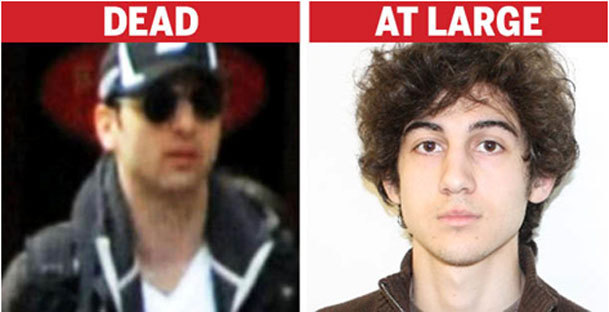Since the news broke this morning that the likely perpetrators of the Boston Marathon bombing are two brothers from Chechnya, speculation has been rampant about their ties to militant groups there. That zero evidence supports that proposition seems irrelevant. We’re on Twitter Standard Time and we expect answers instantaneously.
Alan Cullison and Devlin Barrett wrote an excellent profile on the brothers Tsarnayev, which was posted at the Wall Street Journal before 11 am. It pointed out that the family arrived in Cambridge, Massachusetts, years ago in order to “seek refuge from the war in Chechnya, where an Islamist rebellion had been crushed by the Kremlin under President Vladimir Putin.” The oldest brother, Tamerlan, age 26, was killed in a shootout with Watertown police. His 19-year-old brother, Dzhokhar, is still as of this writing on the loose. Their father, Anzor, is described as “a talented car mechanic” but one who never mastered English and has failed to achieve his aspirations of owning his own garage.
The details of their arrival and lifestyle are understandably sketchy; they were, until a few hours ago, of very little public interest. A friend quoted in the piece has the whole family coming to America “around 2002.” The authorities say one came “with his parents in 2002 and the other on his own in 2004.” Regardless, that means the brothers spent their formative years in the Boston area.
Joshua Foust, a Central Asia analyst who’s a member of the Atlantic Council’s Young Atlanticist Working Group, argues in the Christian Science Monitor that the rush to get ahead of the facts has already led to numerous false accusations, with everyone from an innocent Saudi national to local high school students generating rampant speculation. He contrasts the frenzy of both social and mass media with the quiet professionalism of the authorities, noting that “the Boston police and the FBI deserve tremendous praise for being restrained in their public statements, cautious about what they say in press conferences, and quick in identifying and locating the two alleged bombers.”
Presuming that the Tsarnayevs are in fact the perpetrators—and certainly their actions since last night give every indication that they are—it’s simply not useful to jump to unfounded conclusions based on their national origin. As Foust observes, “When analysts write that two people who immigrated to the United States as children suggest that there is a connection to Chechnya’s conflict with Russia, they are being irresponsible.” He adds, “Caution and skepticism, then, is the name of the game now. Boston police and the FBI will undoubtedly release more information over time. It is important to let them do their jobs, and not rush to a judgment that may well be false.”
Having been blogging for over a decade, I understand better than most the desire to get information and analysis up quickly. But there’s no real value in sitting glued to the television or to Twitter absorbing idle speculation. Four days—the span since the bombing spoiled Patriots Day—seem like an eternity in the age of Twitter. We’re accustomed to instant answers. But, in the absence of useful information, it’s all just noise and potentially dangerous at that.
James Joyner is managing editor of the Atlantic Council.
Image: boston-marathon-bombing-suspects.jpg
